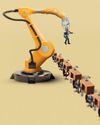Prøve GULL - Gratis
AI Isn't Coming for Your Job At Least Not Yet
Fortune US
|April - May 2024
So far, the technology has replaced only a small number of workers. But the future risks many more.

WHEN CEOS TALK to investors about layoffs, they usually blame economic uncertainty or business "headwinds." Now a new term is starting to crop up in these announcements: AI.
In recent months, shipping giant UPS announced plans to cut 12,000 office jobs that CEO Carol Tomé said were unlikely to return because the company was increasingly using AI to automate tasks these workers performed. Meanwhile, financial giant BlackRock said it would eliminate about 600 positions, couching the cuts as an effort to prepare for coming shifts in the asset management industry, of which AI is among several drivers.
Then there was Google, which recently laid off adsales staff partly because new AI tools were helping customers manage ad campaigns themselves. And IBM CEO Arvind Krishna said Big Blue would pause hiring for 7,800 roles because AI could now do the work instead.
To some commentators, these developments are early confirmation that long-standing predictions of AI causing widespread job loss, perhaps even ushering in an era of "mass unemployment," are about to be realized. This narrative of AI-driven job loss is so ingrained in the public consciousness that people often see evidence for it when none exists.
While the U.S. unemployment rate rose slightly to 3.9% in February, it remains near historic lows. Yet when executive search firm Challenger Gray & Christmas released a report saying there had been 4,600 U.S. job cuts directly attributed to AI from May to January, some commentators interpreted the relatively low number as evidence that firms were hiding the true extent of AI casualties because they feared public backlash.
Denne historien er fra April - May 2024-utgaven av Fortune US.
Abonner på Magzter GOLD for å få tilgang til tusenvis av kuraterte premiumhistorier og over 9000 magasiner og aviser.
Allerede abonnent? Logg på
FLERE HISTORIER FRA Fortune US

Fortune US
GET READY TO OWN A TOKENIZED PORTFOLIO
A BLOCKCHAIN \"FREIGHT TRAIN\" IS ALREADY REMAKING WALL STREET'S FINANCIAL PLUMBING. IT COULD MAKE TRADING EVEN FASTER AND CHEAPER
6 mins
December 2025 - January 2026
Fortune US
RESOURCES HOW RARE EARTHS BECAME GROUND ZERO IN THE U.S.-CHINA RIVALRY
THE WATERSHED moment came in July when the federal government became the largest shareholder of MP Materials, a California miner of rare earth elements.
2 mins
December 2025 - January 2026

Fortune US
PASSIONS A BLISSFUL ESCAPE FROM DECISION FATIGUE
THE TASTING MENU at Uberto ends, like many others at restaurants of this caliber, with mignardises.
4 mins
December 2025 - January 2026

Fortune US
JAMIE DIMON OF JPMORGAN CHASE ON STEERING AMERICA'S BIGGEST BANK THROUGH 'INFLATIONARY' TIMES
CEO JAMIE DIMON has led JPMorgan Chase through periods of rapid change and epic turmoil—and Jan. 1, 2026, will be his 20th anniversary in the role.
6 mins
December 2025 - January 2026

Fortune US
WHAT TO BUY, AND NOT BUY, IN 2026
THREE YEARS OF EUPHORIA IN STOCKS AND OTHER ASSETS HAVE INVESTORS BRACING FOR TROUBLE. HERE'S WHAT TO DO IF BAD NEWS ARRIVES.
7 mins
December 2025 - January 2026

Fortune US
Breaking the Mold
The Trade Desk's Al-powered platform and open-web ethos has propelled it onto the S&P 500.
2 mins
December 2025 - January 2026

Fortune US
WINE TARIFF THREATS AND GEN Z SOBRIETY HAVE PUT BORDEAUX ON RED ALERT
IN THE TASTING room of a Bordeaux winery, a photo on the wall shows a pastoral tableau: three generations of the Dubois family, sipping wine on the patio of their Les Bertrands château, with their Australian shepherd, Namek, perched at their feet.
6 mins
December 2025 - January 2026

Fortune US
HOW AN AI BUBBLE COULD RUIN THE PARTY
IF AI REVENUE DOESN'T CATCH UP WITH AI SPENDING, GLOBAL STOCKS WILL BE AT RISK.
6 mins
December 2025 - January 2026

Fortune US
INNOVATION IS THE ERA OF ROBOT-DRIVEN UNEMPLOYMENT ALMOST UPON US?
AT A PRESS EVENT LAST YEAR, Amazon Robotics chief technologist Tye Brady told Fortune that the idea that there's a battle of robots versus humans inside Amazon's warehouse network is a “myth.”
5 mins
December 2025 - January 2026

Fortune US
Nvidia is invincible. Unless it isn't.
The doubters are coming for the world's most valuable company.
11 mins
December 2025 - January 2026
Listen
Translate
Change font size
